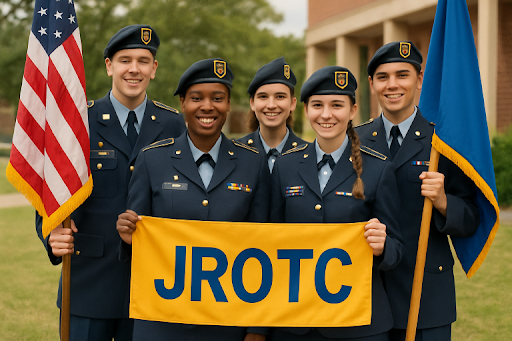Key Takeaways:
- Army JROTC programs instill leadership, discipline, and civic responsibility in high school students.
- Participation enhances physical fitness, teamwork, and critical thinking skills.
- JROTC cadets often engage in community service, fostering a sense of civic duty.
- Graduates are well-prepared for both military and civilian leadership roles.
Introduction
The Junior Reserve Officers Training Corps (JROTC) is a highly regarded program within high schools across America, focusing on developing the next generation of leaders through structured training and educational experiences. These programs are designed not only to teach discipline and responsibility but also to provide students with a foundation for lifelong success in both military and civilian careers.
JROTC stands out for its comprehensive curriculum, which combines classroom instruction with experiential learning. Students are encouraged to grow in all areas of their lives, including leadership, academics, and personal fitness, thereby fostering well-rounded individuals who are ready to take on the challenges of tomorrow.
Participation in JROTC benefits students by honing critical skills such as teamwork, decision-making, and public speaking. The program’s emphasis on civic duty ensures cadets leave with a strong sense of community responsibility, shaping them into active, engaged citizens.
Moreover, the structure provided by the JROTC program shapes character and confidence, giving young people the tools to become effective leaders in whatever path they choose. Through a blend of mentorship and hands-on training, cadets find direction and motivation for personal success.
Leadership Development
One of the foundational pillars of Army JROTC is leadership development. From the outset, cadets are encouraged to take on roles of increasing responsibility, such as squad leaders or platoon sergeants. Through this framework, students acquire practical skills, including how to delegate, resolve conflicts, and make informed strategic decisions that impact their peers. During events like the Army Junior ROTC Cadet Leadership Challenge, real-world leadership scenarios enable cadets to apply theoretical concepts in practice, developing communication and management skills that are invaluable in all aspects of life. This process helps students build self-confidence and a strong sense of accountability that carries over to academic and professional settings.
These experiences help prepare cadets not only for potential careers in public service but for any leadership opportunity they may encounter in the workforce or community. Leadership training in JROTC goes beyond rote memorization, focusing instead on cultivating adaptive, ethical, and collaborative leaders.

Academic and Physical Training
Army JROTC takes an integrated approach to development, combining academics and physical fitness to ensure cadets are well-prepared for diverse challenges. Academically, the curriculum encompasses military history, government, communication skills, and ethical behavior, providing students with a solid foundation of knowledge and practical life skills. Physical education remains a core component, promoting the value of health and wellness while also incorporating team-building exercises. Regular physical training improves strength, agility, and resilience, while fostering camaraderie among cadets—a critical aspect of military and team success.
These dual aspects create a learning environment where students excel in both mind and body, reinforcing the holistic teachings promoted by JROTC instructors and mentors. The result is young adults who are ready for the rigors of college, military service, or immediate entry into the workforce.
The U.S. Army website highlights how JROTC Day showcases the collective accomplishments of cadets while recognizing the ongoing importance of academic and athletic achievement within the program.
Community Engagement
Community service lies at the heart of the JROTC ethos. Cadets participate in volunteer activities, including organizing food drives, cleaning local parks, and supporting charitable events. These experiences not only develop a sense of civic pride and empathy, but they also build confidence in public interaction and event planning. Through service, cadets learn the value of giving back and the vital role community involvement plays in sustaining strong, healthy neighborhoods. These formative experiences instill lifelong habits of service and engagement, setting the standard for future civic leadership.
Career Pathways
Although Army JROTC is not designed as a military recruitment program, it does provide a gateway for students interested in defense careers, public service, or other leadership-oriented fields. JROTC helps students understand military structure, expectations, and values, giving them a distinct advantage should they choose to pursue a career in the military at the college level or enlist after high school. Importantly, many graduates go on to pursue higher education, leveraging the discipline and teamwork learned through JROTC in a wide variety of professional contexts. The program’s emphasis on ethical leadership, responsibility, and integrity ensures that alumni are highly valued in the workforce, regardless of their chosen career paths.
Mentorship and Guidance
Experienced instructors—often retired military officers or noncommissioned officers—form the backbone of the JROTC mentorship system. These mentors offer more than just instruction; they provide personal guidance, encouragement, and practical advice on navigating academic, personal, and career challenges. By establishing meaningful relationships with their cadets, instructors help young people set and achieve goals while modeling core values like accountability, perseverance, and service. Many students credit their JROTC mentors with having a lasting, positive influence on their lives and development.
Technological Integration
Today’s JROTC classrooms are embracing technology to prepare cadets for the demands of modern society. Virtual leadership simulations, online modules, and digital mentorship platforms enable cadets to learn efficiently and adapt to technological advancements that are shaping all fields. Competence with new technologies not only improves engagement and learning outcomes but also ensures cadets are ready for the digital workplace and the evolving nature of military and civilian leadership roles. The integration of digital resources represents the future of education, keeping the JROTC program current and relevant for young leaders.
Conclusion
Army JROTC programs provide a transformative experience for thousands of high school students, imparting essential skills in leadership, academics, fitness, and citizenship. By blending tradition with innovation, mentorship with hands-on opportunities, and discipline with support, JROTC continues to shape future leaders across America. Graduates leave with the confidence and competence to thrive as responsible citizens and dynamic leaders in every sector of society.



